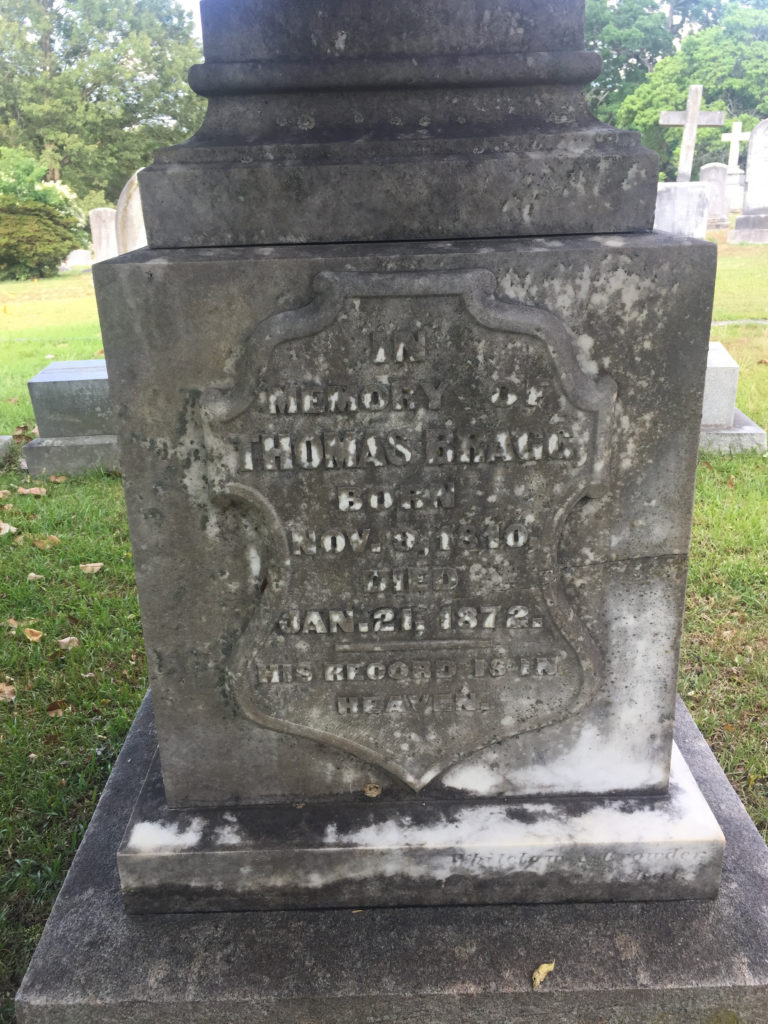Erik Visits an American Grave, Part 773
This is the grave of Thomas Bragg.

Born in 1810 in Warrenton, North Carolina, Bragg grew up in a slaveholding family, not quite elite, but certainly more than comfortable enough to own humans. He first studied at a military academy in Connecticut and then went to what is today Norwich University-The Military College of Vermont, which is not so known today by the general public but which played a major role in American military education for a long time and is where the ROTC was founded. After graduation, Bragg returned to North Carolina and went into the law. He was admitted to the bar in 1833 and started a practice in Jackson, North Carolina.
Bragg started on a political career in 1842 when he ran for state legislature and won, being named the head of the Judiciary Committee. He only stayed there for a year and then became prosecuting attorney for Northampton County. He was a state-level Democratic leader, but Northampton County was a center of the Whig Party and so he didn’t have a lot of electoral success. In 1854, Bragg ran for governor of North Carolina–as a Democrat of course–and won. What was different about 1854? The Kansas-Nebraska Act, which effectively killed the already declining Whig Party as the South moved toward ever more belligerent and extreme politics. This opened up the door for people such as Bragg. His two terms as governor weren’t all that exciting–he was generally seen as a moderate and was focused mostly on internal improvements, especially railroad construction, and banking. But his moderation was limited. He was a strong states-rights Democrat who believed the federal government had no business regulating slavery at all. He just wasn’t sure that open rebellion was the answer. This is what passed for moderation in North Carolina in the 1850s.
After his terms as governor, North Carolina sent Bragg to the Senate in 1859. He didn’t stay too long. When the South committed treason in defense of slavery in 1861, Bragg went for it too. As a general rule, he was still considered a moderate. He did not speak about secession in the Senate and people didn’t see him as a fireeater. Privately, he expressed strong reservations that secession was a good idea. But he made his choices and he chose treason, resigning from the Senate. Jefferson Davis named him Attorney General. They were close friends and allies. Judah Benjamin was the first AG on the treason state, but he switched to Treasury and Davis asked Bragg to replace him instead of raising troops. But there was a lot of tension in the Confederacy. Lots of moderates and ex-Whigs did not feel represented in the extremist government. So in 1862, Davis asked Bragg to step aside so he could name someone to placate the ex-Whigs, which turned out to be Thomas Watts.
In terms of his time as AG of the treason states, most of Bragg’s energy was spent on the reality of secession. Lots of southern whites wanted nothing to do with secession, especially in mountainous regions with relatively few slaves and a lot of resentment toward the planter class. He left before draft resistance really became a problem, but the Confederacy was on the way toward that. Several states, including his own, took states rights seriously enough that they immediately resented a federal government in Richmond that immediately turned on the idea and made very strong demands on state governments. These realities is probably why Bragg thought secession wasn’t going to work. But again, he made his choice.
Bragg initially retired to Petersburg, Virginia, where his wife was from. But he was still close to Davis and the president needed him. Bragg became basically Davis’ personal representative in Raleigh to keep the state actually supporting the Confederate cause when it turned out to be one of the more difficult states for Richmond. He did his duty and pushed the treason cause, no matter what his private thoughts remained.
After the war, Bragg went back to his law practice. In 1870, North Carolina decided to impeach its governor, William Woods Holden, who was a Republican and trying to enforce Reconstruction and crack down on the Ku Klux Klan. North Carolina was aggressively reasserting white supremacy and Bragg was at the center of that. He was the special counsel for the impeachment proceedings, which did lead to Holden being ejected from the office.
Bragg died in 1872. He was 61 years old.
Thomas Bragg is buried in Oakwood Cemetery, Raleigh, North Carolina.
This grave visit was funded by LGM reader donations. This is not from my recent trip though, but rather my 2019 trip to the South. As always, I thank you profusely for making this series happen. If you would like this series to visit other members of the Treason Cabinet, you can donate to cover the required expenses here. Judah Benjamin is in Paris (oh don’t send me to France, please no!). In terms of the U.S., Stephen Mallory is in Pensacola, Florida and LeRoy Pope Walker is in Huntsville, Alabama. Previous posts in this series are archived here.
